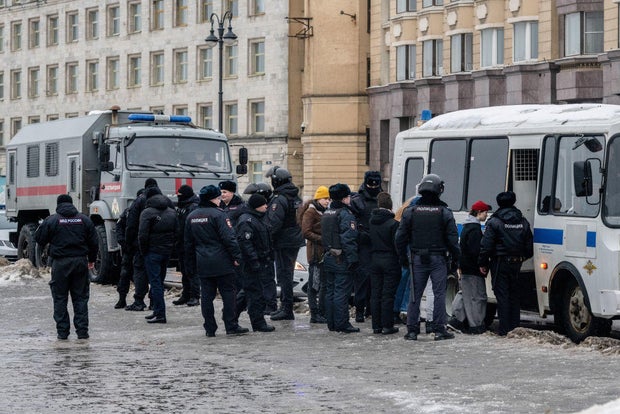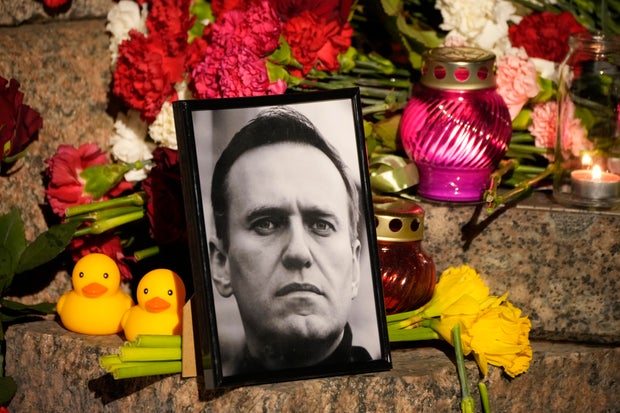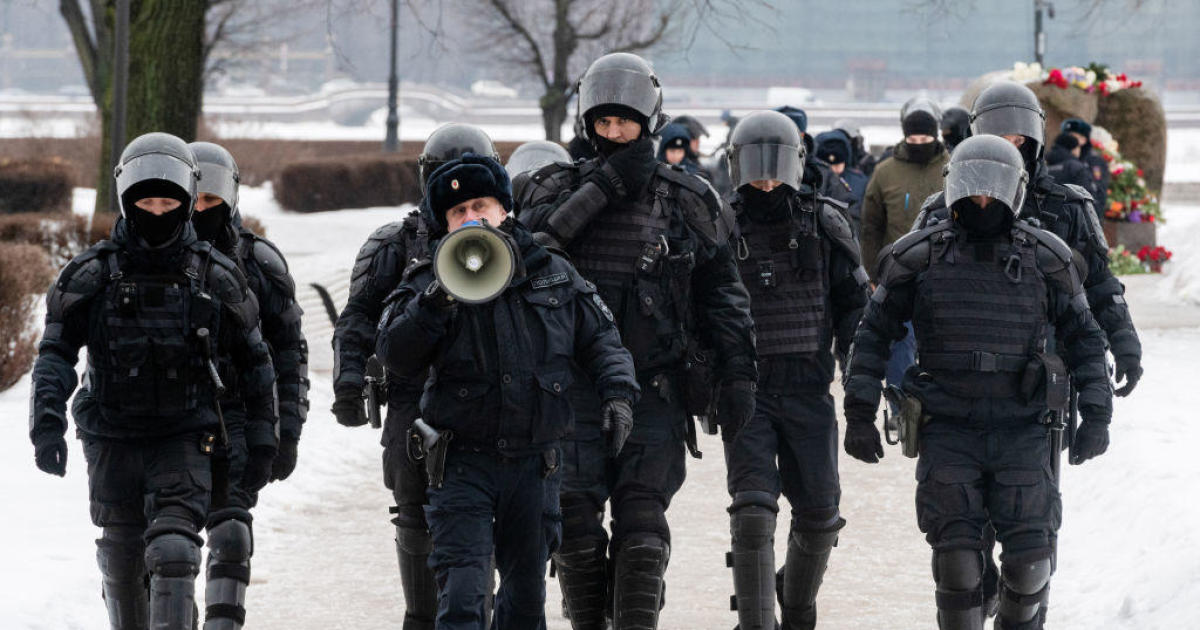/ CBS/AP
The death of Alexey Navalny, Putin's most vocal critic
More than 400 people were detained in Russia while paying tribute to opposition leader Alexey Navalny, who died at a remote Arctic penal colony, a prominent rights group reported.
The sudden death of Navalny, 47, was a crushing blow to many Russians, who had pinned their hopes for the future on President Vladimir Putin's fiercest foe. Navalny remained vocal in his unrelenting criticism of the Kremlin even after surviving a nerve agent poisoning and receiving multiple prison terms.
The news reverberated across the globe, and hundreds of people in dozens of Russian cities streamed to ad-hoc memorials and monuments to victims of political repressions with flowers and candles on Friday and Saturday to pay a tribute to the politician. In over a dozen cities, police detained 401 people by Saturday night, according to the OVD-Info rights group that tracks political arrests and provides legal aid.
More than 200 arrests were made in St. Petersburg, Russia's second largest city, the group said. Among those detained there was Grigory Mikhnov-Voitenko, a priest of the Apostolic Orthodox Church — a religious group independent of the Russian Orthodox Church — who announced plans on social media to hold a memorial service for Navalny and was arrested on Saturday morning outside his home. He was charged with organizing a rally and placed in a holding cell in a police precinct, but was later hospitalised with a stroke, OVD-Info reported.

Courts in St. Petersburg have ordered 42 of those detained on Friday to serve from one to six days in jail, while nine others were fined, court officials said late on Saturday. In Moscow, at least six people were ordered to serve 15 days in jail, according to OVD-Info. One person was also jailed in the southern city of Krasnodar and two more in the city of Bryansk, the group said.
The news of Navalny's death came a month before a presidential election in Russia that is widely expected to give Putin another six years in power. Questions about the cause of death lingered on Sunday, and it remained unclear when the authorities would release his body to his family.
Navalny's team said Saturday that the politician was "murdered" and accused the authorities of deliberately stalling the release of the body, with Navalny's mother and lawyers getting contradicting information from various institutions where they went in their quest to retrieve the body. "They're driving us around in circles and covering their tracks," Navalny's spokeswoman, Kira Yarmysh, said on Saturday.
"Everything there is covered with cameras in the colony. Every step he took was filmed from all angles all these years. Each employee has a video recorder. In two days, there has been not a single video leaked or published. There is no room for uncertainty here," Navalny's closest ally and strategist Leonid Volkov said Sunday.
A note handed to Navalny's mother stated that he died at 2:17 p.m. Friday, according to Yarmysh. Prison officials told his mother when she arrived at the penal colony Saturday that her son had perished from "sudden death syndrome," Ivan Zhdanov, the director of Navalny's Anti-Corruption Foundation, wrote on X, formerly known as Twitter.

Russia's Federal Penitentiary Service reported that Navalny felt sick after a walk Friday and became unconscious at the penal colony in the town of Kharp, in the Yamalo-Nenets region about 1,200 miles northeast of Moscow. An ambulance arrived, but he couldn't be revived, the service said, adding that the cause of death is still "being established."
Navalny had been jailed since January 2021, when he returned to Moscow after recuperating in Germany from nerve agent poisoning he blamed on the Kremlin. He has received three prison terms since his arrest, on a number of charges he has rejected as politically motivated.
After the last verdict that handed him a 19-year term, Navalny said he understood he was "serving a life sentence, which is measured by the length of my life or the length of life of this regime."
Hours after Navalny's death was reported, his wife, Yulia Navalnaya, made a dramatic appearance at the Munich Security Conference.
She said she was unsure if she could believe the news from official Russian sources, "but if this is true, I want Putin and everyone around Putin, Putin's friends, his government to know that they will bear responsibility for what they did to our country, to my family and to my husband."
Thanks for reading CBS NEWS.
Create your free account or log in
for more features.
